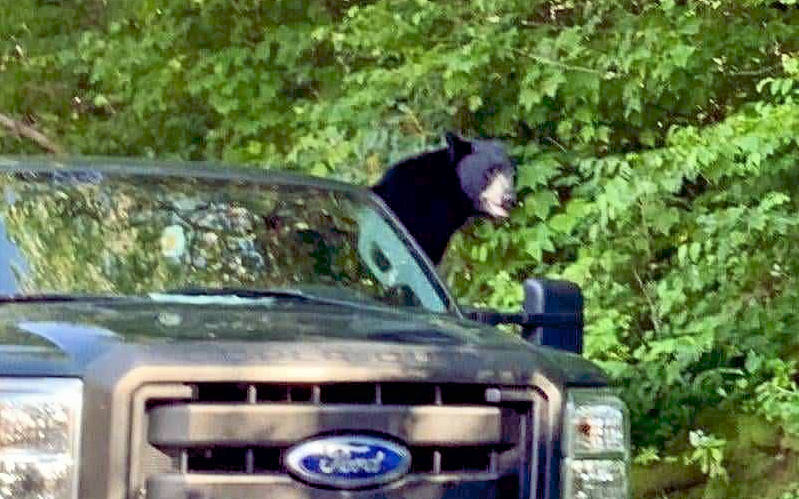
Please protect our deer, bear and other wildlife on Sugar Mountain by not feeding them and removing temptations. And this helps protect you as well!
Don’t Feed Deer
The woodlands in the Village of Sugar Mountain are home to many deer. There are many good reasons not to feed deer. Here are a few:
- Feeding deer increases the chance of disease transmission to wildlife, people and pets. Providing food handouts entices deer and other wildlife to congregate unnaturally in a small area. Contagious and deadly diseases such as Chronic Wasting Disease (CWD), distemper, and rabies can be spread.
- Feeding leads to unhealthy deer and foraging habits. While it sounds tasty, “deer corn” is like junk food for deer, and causes painful ailments such as hoof deformities. It also causes severe diarrhea and dehydration, which could be deadly.
- Feeding creates unintended conflicts with humans. Wild animals that are used to being fed by humans commonly lose their fear of people.
- Feeding destroys surrounding native and purchased plantings in the feeding area. Deer visit the feeding areas more frequently and will eat leaves off most plants and trample ground plantings.
For more information from the NC Wildlife Commission: Is Feeding Deer Harmful?
Note: If you notice a baby fawn (especially in spring) laying by itself, do not approach. It’s common for mom to leave the newborn during the day. She will move the newborn each day to avoid predators.
Bear Safety
Bears are occasionally spotted on Sugar Mountain, even though they are most active at night. The six BearWise Basics from the NC Wildlife Commission are:
- Never feed or approach a bear — either intentionally or unintentionally. Feeding bears trains them to look for food by approaching homes and people. Bears are particularly attracted to bird seed, hummingbird feeders, garbage and other human-associated foods, like pet food. Bears will defend themselves if a person gets too close, so do not risk your safety or theirs.
- Secure food, garbage and recycling. Food and food odors attract bears. Store bags of trash inside cans in a garage, shed or other secure area; or use garbage cans or trash containers with a secure latching system that is bear resistant. Place trash outside as late as possible on the morning of trash pick-up — not the night before. Do not leave snacks in your car and keep it locked. Bears can open car doors. If you don’t believe this, read this news article about a nearby incident.
- Remove bird feeders when bears are active. Birdseed, other grains and hummingbird feeders have high calorie content making them very attractive to bears.
- Never leave pet food outdoors. Feed outdoor pets portion sizes that will be completely eaten during each meal and remove the empty food bowl.
- Clean and store grills. Make sure all grease, fat and food particles are removed, even from the drip tray, after each use. Once the grill is clean, store it in a bear-resistant location, like a garage or shed.
- Alert neighbors to bear activity.
If you encounter an aggressive or injured bear, contact NC Wildlife Helpline at 866-318-2401 (Mon-Fri. 8 am- 5 pm) or the NC Wildlife Enforcement Division at 800-662-7137 outside of business hours.
Note: Bear Proof Trash Cans are required for residential pick-up on Sugar Mountain. Read more.
 This bear climbed into a truck on Sugar Mountain for McDonald’s leftovers in a bag. A bear can smell a food source from one mile away!
This bear climbed into a truck on Sugar Mountain for McDonald’s leftovers in a bag. A bear can smell a food source from one mile away!
If You See a Bear…
Usually, our bears run away from people. If you see a bear, make the bear aware of your presence speaking in an assertive voice, clap your hands, wave your arms above your head to try to make yourself look bigger and make a lot of noise. Mama bears may become aggressive when protecting her cubs. Stay far away from cubs and keep your dogs on a leash.
Bears have adapted to living near people; now it is up to people to adapt to living near bears. Go to the Bearwise website for more details.
May Wildlife Rehabilitation Center
On the nearby Lees-McRae College Campus, this center annually admits more than 1,500 injured and orphaned wildlife patients from western North Carolina. Call them at 828-898-2568 before you attempt to help injured wildlife. Read more about them.
Important Phone Numbers
Sugar Mountain Police Emergency: 911
Sugar Mountain Police Non-emergency: 828-898-4349
NC Wildlife Help Line: 866-318-2401 (M-F 8-5)
NC Wildlife Enforcement: 800-662-7137 (after hours)
